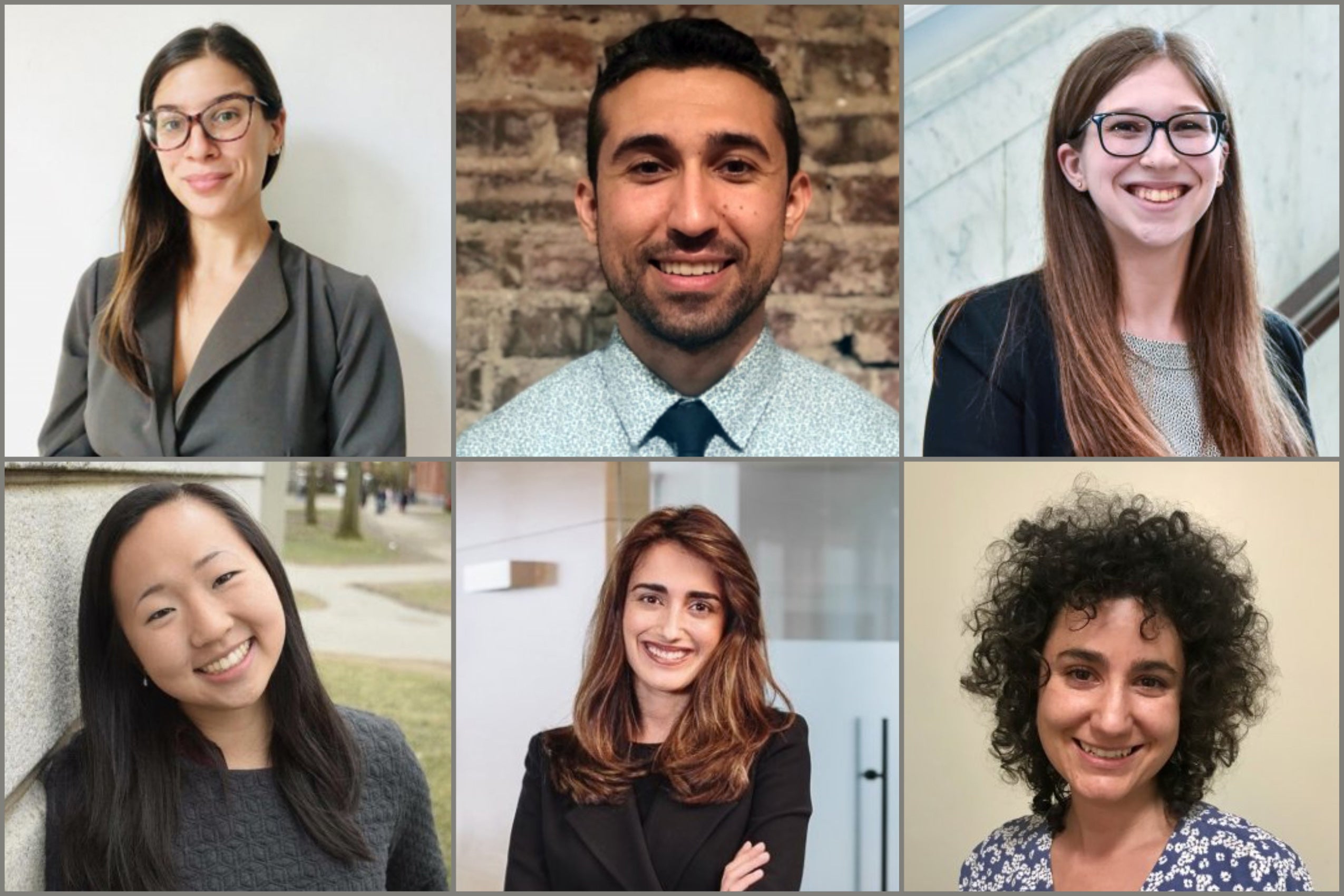Student fellows at the Petrie-Flom Center for Health Law Policy, Biotechnology, and Bioethics recently celebrated their fellowships’ end virtually when their capstone meeting moved to Zoom due to the COVID-19 pandemic.
“Please accept a virtual glass of champagne on behalf of the Petrie-Flom Center,” joked Executive Director Carmel Shachar J.D./M.P.H. ’10 at the event kick off on April 15.
Attendees put up virtual backgrounds of the Harvard Law School campus, “clapped” through the meeting reaction button, and navigated the inevitable technical difficulties while sharing the culmination of the year’s scholarship with Petrie-Flom Center faculty and affiliates.
Also joining were some of the student fellows’ industry mentors, who included retired hospital and pharmaceutical industry executives. These presentations were the culmination of a year of independent research on a topic of each student’s choosing, as well as consistent blogging on health policy and bioethics for the Petrie-Flom Center’s blog, Bill of Health. Several of the student fellows plan to publish their findings in legal or medical journals.
Alexa Richardson ’21 spent the year researching the “epidemic of obstetric violence” in the U.S., focusing on nonconsensual procedures that occur during childbirth. The subject has particular relevance during the COVID-19 pandemic, she said. “The issues are coming to a head right now with the COVID situation. All sorts of preferences and medical decision-making are being denied during labor because of the COVID crisis,” she added, noting a short-lived policy in New York state that banned partners from supporting a birthing person during labor.
Research by Phebe Hong ’21 on the “China factor” in CAR T-cell therapy innovation also reflected particularly timely concerns. Her work compared regulatory approaches between the United States and China in developing new cancer treatments that leverage a patient’s own immune cells. The “China factor” refers to perceptions that the country has a relatively relaxed regulatory environment—an issue that is top of mind as China leads global research efforts around COVID-19.
The research of Adriana Krasniansky, a graduate student at Harvard Divinity School, has also taken on added significance amid the pandemic. Her work on the ethical dimensions of using voice assistant devices for in-home health care reflects fast-moving debates around privacy and other health care delivery concerns amid the rush to telemedicine during the pandemic.
Beatrice Brown, a graduate student in the master of bioethics program at Harvard Medical School, spent the year re-conceptualizing the meaning of “physician as healer” in order to reconcile professional debates about physician-assisted death. Healing, Brown explained, is traditionally conceptualized as a “return to wholeness.” But, she noted, this definition does not address how a physician can act as healer when it is impossible to help a patient achieve wholeness, such as in the case of terminal illness. “Patients still need compassion and support at end of life,” Brown said. This led her to a new definition of healing—one that encompasses either a return to wholeness, or the removal of suffering through death.
Rounding out the presentations, Daniel Aaron J.D./M.D. ’20 addressed the nation’s opioid epidemic. Aaron’s work focused on the legal strategy of multi-district litigation (MDL) against opioid manufacturers and whether this sufficiently represents the public health concerns posed by the opioid crisis. Aaron argued that the MDL strategy does not fulfill overarching duties to public health. “Litigation favors efficiency, settlement, fast money, global peace,” he said. But public health demands accountability, he added, suggesting that mass disaggregation of the MDL might better serve this interest.
Following each presentation, fellows, mentors, affiliates, and faculty engaged in lively discussion. Unfortunately, due to a 16-hour time difference, New Zealander Sarah Alawi LL.M. ’20 was not able to attend, though her work on the enforceability and interpretation of pre-conception agreements was acknowledged.
“These presentations indicate such a breadth of scholarship,” Shachar concluded. “We feel very lucky to have had you as fellows in one of the most exceptional years to date.”
“You’ve been an incredibly delightful group,” added faculty director I. Glenn Cohen ’03. “Ordinarily we’d be breaking out the champagne now. We’re very sad that we can’t do that, but we’re thankful for your engagement. I have high expectations for all of you, and I have no doubt that you’ll be able to meet those expectations. Thank you for a terrific year.”
Join the next cohort of Petrie-Flom Center student fellows: HLS students are encouraged to apply by the priority deadline of Friday, May 22, 2020.
